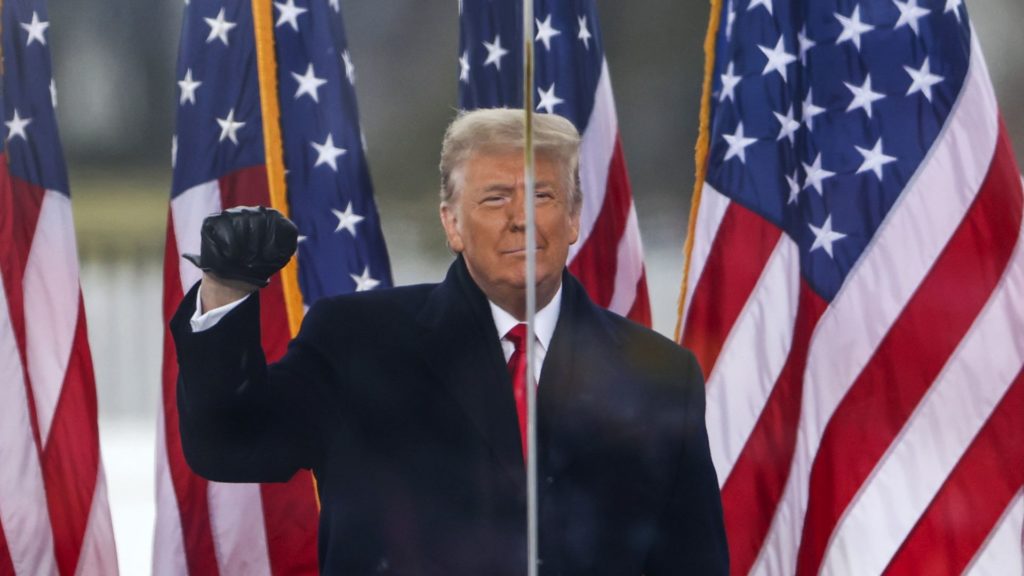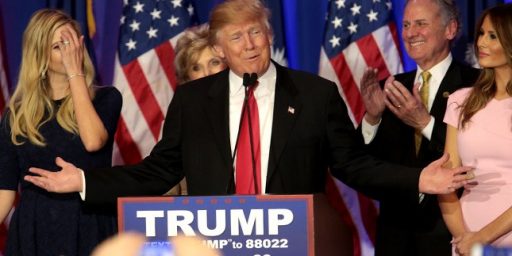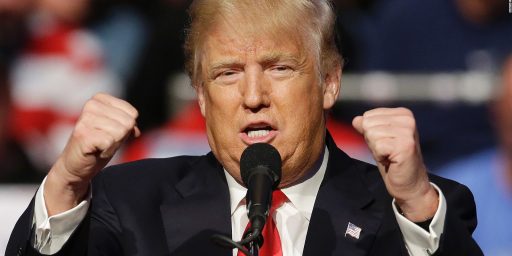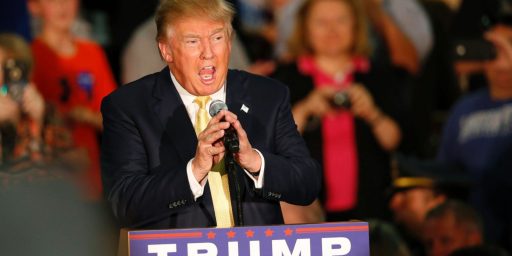GOP “Unity”
Data from the early primaries

Let me start by noting I am on the same basic page as James Joyner regarding the fact that there is no real competition going on in the GOP primary and that lion’s share of the coverage makes it sound like a real contest when it isn’t. Indeed, I can only assume that Haley and her financial backers are betting that there is a sufficiently high chance that Trump will be convicted before the convention and she is positioning herself to be the party’s emergency Trump replacement. No other explanation makes much sense, not even positioning herself for 2028.
But I do want to address something that Trump said after his victory in South Carolina:
“I have never seen the Republican Party so unified as it is right now,” Trump declared, taking the stage for his victory speech mere moments after polls closed.
It will come as a shock, no doubt, to many readers, but this statement is not accurate. Indeed, Trump himself witnessed a much more unified GOP in 2020 when he ran for re-election.
I would note the following (all via Fox News):
- 48.99% (share of anti-Trump vote in the Iowa caucuses)
- 45.66% (share of the anti-Trump vote in the New Hampshire Primary)
- 40.21% (share of the anti-Trump vote in the South Carolina Primary)
I will note that the Nevada caucus was a sign of unity (Trump received 99.11% of that vote) but in the primary portion of that contest, 36.74% of voters chose a candidate who was neither Trump nor “none of these candidates.”
This is not, by definition, unity. This is a situation wherein is clear that Trump does not have full support even of voters willing to vote in a nominating process wherein it is clear who is going to win each contest. Put another way, there are tens of thousands of Republican primary voters out there willing to go to the polls to simply express their desire that someone other than Trump be the nominee.
If Dean Phillips was peeling off these kinds of numbers against Biden it would both be true that Biden would be winning, but also that the press would consider him in major trouble. And while Biden’s position as the incumbent would exacerbate and amplify division in the party, it should be noted that Trump is, for all practical purposes, essentially an incumbent (or, as close as you can get without actually being in office while running).
At a minimum, I think that press coverage of this race should not be treating Trump’s party as unified (since he is obviously going to be the nominee) and start asking why so many Republicans are saying they don’t want him. (If Dean Phillips could even get 20% of the vote, the press would be freaking out about how the Democrats are not fully behind their guy).
The press is pretty much treating the GOP as unified,* but it isn’t. Now yes, as I have noted for years, the structure of presidential elections and the power of partisanship will mean that the lion’s share of these primary voters will shift to Trump for the general election. But I would still note that it matters if a substantial chunk of the selectorate does not like the party’s nominee.
I would note that both the AP story that I quoted above and NPR this morning, just let Trump’s assertion of unity go by utterly unchallenged.
*Indeed, many OTB readers do the same thing.





Excellent point. Obvious to me (& I suspect most of the OTB aficionados), but excellent nonetheless. Now if the oligarchs owning the “news” reporting media would encourage (or even allow) such reporting, things might have a different tone.
Yep. Interesting. And we don’t need those dissatisfied Republicans to vote for Joe, we just need them to stay home.
For the “Dems in disarray” trope to work – especially in a binary system – the other guys must be united.
QED
Bush beat Buchanan by a bigger margin in 1992, and that primary is taken as a sign of the coming GOP crack-up. The media, then, still felt an obligation to explain what was happening without the explanation being a threat; mostly because the system still kinda worked. A media which has mystified every aspect of life can no longer tell normal stories.
Lardass can best be understood using a combination of Bizarro World language and Newspeak.
So, when he says something has never been this good, it means it’s near its worst. If he claims to be the first to do X, it means he’s merely the latest to do so, and possibly he did it late.
But, would that it were that simple. There is some very un-Lardass nuance involved. Specifically, when he claims no one’s been treated more unfairly, it means he’s getting what he deserves, and with way more deference towards him than is warranted.
Political Punditry is basically gossip, and the reporters who engage in it essentially vie with each other to land the highest ranking (in a “Mean Girls” way”) source of dish. They have a habit of blindly repeating whatever take they are fed, and those sources have agendas. So it is expected but unremarkable that they are unaware what a big deal this is. Trump is essentially the incumbent, but he has a serious challenger he can’t vanquish or drive from the race. The closest counterpart is Carter versus Kennedy in 1980. Opinion differs as to whether Kennedy weakened Carter or he was already a fatally weak candidate, but that’s beside the point. Having so many primary voters wishing for someone else was bad news for Carter and he lost resoundingly.
It’s important that Biden’s allies and the never Trump fight this narrative of overwhelming victory. Trump’s only appeal is that he is seen as strong, overwhelmingly so. Listen to his supporters and you hear this over and over. The best way to attack Trump is to show him as weak.
The Press is engaged in Coronation reporting. No perspective whatsoever. Three small state primaries/caucuses are in books now, and with the resounding support of 51 to 60 percent of Republicn voters …. so of course he wants to declare victory and go back to Mar-a-Lago and rearrange the classified documents he 'forgot' to return to the Archives.
I know it’s not quite relevant to all all of this, but I’m old enough to remember when, in the 1968 New Hampshire primary, anti-war candidate Senator Gene McCarthy won 42% of the vote, to LBJ's 50%, and that convinced Johnson to forego seeking re-election.
Haley is non-trivial opposition to Trump, but it seems clear to me that Haley is hanging around in the event that Trump is convicted of the most serious stuff and/or must drop out. In which case I doubt that the GOP would turn to Haley anyway.
One other important thing to note is that in each of those primaries Trump has under performed the preprimary polling.
See for example: https://projects.fivethirtyeight.com/polls/president-primary-r/2024/new-hampshire/
The list of ways in which press coverage should not be treating Trump’s party is getting pretty long such that it becomes harder to believe the reason for the coverage choices is that the press doesn’t know any better. The commercial incentives for the political press outweigh any responsibility there might be to inform the public as the Fourth Estate.
@MarkedMan: I’ve seen pundits try to invoke parallels with 1980 by putting Biden in the Carter category, but I was also talking to someone earlier who made the analogy you’re making, where Trump is the equivalent of Carter, and Haley the equivalent of Ted Kennedy.
Putting aside the fact that Trump is not a real incumbent, Carter was never really a cult of personality who took over the party. If anything, Kennedy was more of a cult figure. I don’t mean he was some demagogue with no substance–far from it. A book I read recently depicted both men as strong personalities, each with reasons for despising the other–Carter because of his poor background (he grew up without running water or electricity) against a rich guy who had everything handed to him on a silver platter, Kennedy because of his liberal beliefs and desire to reform health care which he made practically his life’s mission, and which conflicted with Carter’s fiscal conservatism.
Despite a clip I saw earlier where Lawrence O’Donnell ponders the possibility that Haley might actually be staying in because it’s the right thing to do, I just have a hard time seeing her in that light. She doesn’t strike me as having very many core beliefs, and I think at the end of the day she’s a party loyalist, much more than Trump. I think she legitimately fears her party will lose due to Trump (that was one of main things motivating Hillary to stay in the race against Obama in 2008–obviously she was wrong, but it made sense to her from her perspective), and yes, she does think there’s a real possibility Trump’s legal problems could reach a point of rendering him effectively nonviable as a candidate. I think she’s viewing Trump not just as a weak candidate, but as a sort of ticking time-bomb that will go off before the election, and I don’t think that’s an unreasonable assumption.
@Kylopod: The analogy is imperfect. As you point out, Trump is nothing like Carter and Haley is no Kennedy. But if you accept that Trump is essentially the incumbent, then it serves as one of the few reference points in modern times.
A quick check of the Wiki shows John McCain only got 46.7% of the vote in the GOP primaries in 2008. That’s after Romney dropped out on February 7 and Huckabee dropped out on March 4.
In 1988, George H.W. Bush won 67.9% of the vote and 42 races.
In 2000, Bush won 44 contests and got 62% of the GOP primary vote.
In 2012, Romney won 44 contests in the GOP primary and only wound up with 52.1% of the vote.
In 2024, Trump has won 5 contests and has 59.5% of the GOP vote.
If Steven L. Taylor had done five minutes of actual research, he would have realized his initial theory was dubious at best. If Trump loses in 2024, which is certainly possible, it won’t be because of a lack of Republican “unity” and insisting the media deny obvious reality, like Trump’s dominance in the GOP, is a big reason we’re in the mess we are right now.
@TheRyGuy: Except that central to Dr. Taylor’s point is Trump’s quasi-incumbent status. He’s the most recent Republican president and two-time nominee backed by a cult of personality.
Five seconds of research shows none of this was true of HW in 1988, W in 2000, or Romney in 2012. We would expect quasi-incumbent, former president cult leader Trump to be far more dominant within his party than those fellas.
So your data, if accurate and worthy of one-to-one comparison, makes a case that Dementia Don is in trouble. Despite quasi-incumbent advantages they lacked, he’s running 8-points behind HW, who then easily won the 1988 general election; and 2.5-points behind W, who lost the popular vote and barely took the White House in 2000 by ~1,780 Florida votes.
You have unintentionally co-signed Nikki Haley’s argument that Trump is on track to lose the popular vote and electoral college both.
@MarkedMan:
But I don’t accept that framing, even though I know it’s popular here and in many liberal spaces currently, as a way of highlighting Trump’s electoral weakness.
The problem isn’t that the theory is totally wrong, but that it’s simplistic. Trump may be more like an incumbent than usual for a candidate who is, well, not actually an incumbent, but that doesn’t mean he automatically gets all the incumbent effects–and the fact that he doesn’t, doesn’t automatically mean he’s in trouble. Call him a half-incumbent if you like, as far as his party is concerned. Aside from those QAnon freaks who think he’s still secretly running things, the MAGA narrative for the most part is that he had the election stolen from him, not that he’s still in the White House. Even some Republicans who like him aren’t so devoted to him that they’d never consider someone else.
There’s no reliable way to determine how well he “should” be doing given that having a former president running is so unprecedented in the modern age. But as I’ve pointed out before, in 1980 Ford teased a run and was included in several polls–in most of which Reagan was ahead. In trying to explain Trump’s dominance in the primaries, I think people are focusing too much on his being a former president, and not on the more relevant fact of his cultish hold over the party, something Ford never enjoyed, and which I doubt would have been the case for, say, Carter or Bush Sr. if either had run again after being booted from office.
Is there evidence of resistance to Trump from within the party? Of course there is. But I think the implications for November are ambiguous at best. I think most of Haley’s voters will end up supporting Trump as the nominee, and among the ones who don’t, probably a sizable portion consist of people who didn’t vote for him last time. Primaries almost always make intra-party conflict seem greater than it turns out to be in the general election. Part of the reason is that it takes voters some time to accept that the nominee isn’t going to be who they prefer, and they usually get over it pretty quickly as the partisan incentives kick in.
You may think I’m describing the situation in too normal and generic a way, but if anything I think it applies more now than usual. Just as the media has treated this like a true contest despite the evidence that it never really was, there are still a sizable number of Republican voters who haven’t yet accepted that Trump is going to be the nominee. The more it becomes clear to them that he’s their only chance of stopping a second term for the Dems, the more they’ll “come home.”
Maybe there will be that tiny slice of defections from those who finally, at long last, wake up to the danger Trump poses and are willing to sacrifice their party’s chances at power in order to stop him. I’m not saying people like that don’t exist. But I question how many of them didn’t already abandon the party in 2020–making any effect they have essentially baked in.
@Kylopod:
Nikki “I agree with Alabama on IVF” Haley’s campaign is not a liberal space, but I get your point.
I do believe Trump’s support might have softened since 2020 — and since Jan. 6, 2021. I do think some who voted for Trump in 2020 have abandoned ship since then, and some may still be heading for the exists over his border bill shenanigans, Ukraine aid, IVF, looming criminal convictions, etc. But nobody knows.
@Kylopod:
That “tiny slice of defections” is a big deal in light of Trump’s evident inability to add voters he didn’t have in 2020, isn’t it?
If Trump doesn’t find NEW voters, Biden would need to lose voters (I presume due to his age-based unpopularity and policy positions misaligned with some small segments of the Democratic base) at a clip that is greater than any defections Trump has, plus his margin of victory in the key swing states in 2020. That’s baked in as well.
@Kylopod: You make a strong case, but of course there is no direct analogy, much less the multiples that would be needed to be certain. My impression remains, well, my impression, but I will make a prediction and am willing to bet a drink on it. In 2020, Trump got 92% of Republican/Lean Republican votes cast, and Biden got 94% of the Dempcratoc/Lean Democratic. Biden took Independents 52-43. I predict that:
– Trump will not improve on the 92% and will instead lose at least 1%. I think there is a decent change he won’t reach 90%
– Biden will drop to 92% from 94%
– Biden will gain at least 1% on the Independents and Trump will not gain anything. I think there is a decent chance he declines.
Unfortunately I couldn’t find a statistic on what percentage of registered Republicans voted in 2020, nor how many registered Republicans there were. Everything by party I found was in percentages. But I also predict that Republican turnout will decrease this year
@Kylopod:
I haven’t yet seen any evidence that Nikki believes in anything but Nikki. She’s a party loyalist only to the extent that her own fortunes are tied to those of the GOP. If she thought sucking up to Trump was her best personal play, she’d make Lindsay Graham look like Howard Roark.
The key observation, a week or two ago, is that none of these remaining GOP politicians* actually cares about any outcome other than getting/staying elected. It’s not a means to an end; it’s the only end, Vince Lombardi style.
*I’m sure this is true of some Dem politicians as well, and I leave it as an exercise to the reader whether it’s better to have no principles at all or to be determined to stay in office in order to further hateful principles.
Many Republicans prefer Haley to Trump.
The party will unite behind Trump after he has won the nomination.
Both statements are true IMHO.
@TheRyGuy:
In 1988 G HW Bush had not yet been president.
In 2000 GWB had not yet been president.
In 2012 Romney had never been president (and never would be).
Further, none of them claimed, “I have never seen the Republican Party so unified as it is right now.”
On balance, I would say that you are rather missing the point.
@Scott F.: Trump needs new voters, and not to lose the ones he got.
Biden needs to keep his voters.
But there is another factor – four years of teenagers turning 18.
Do you think they’ll vote for the absurd, old guy who looks like a giant oompa-loompa and can’t form a sentence, or the other old guy who forgave student loans and pardoned federally convicted pot smokers?
I like Biden’s chances, but I hesitate to say that because I fear complacency in an era when one slip means the end of the republic as we know it.